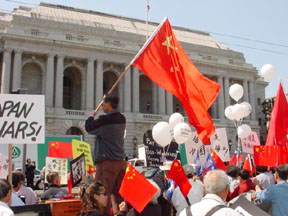|
|
|
|
|
|
|
|
|
|
|
|
Fighting to be Remembered
By Rosa Yum
Bik May Wong and her 90-year-old husband, Kwan Kau Liu, sat in the shade on Grove Street in San Francisco. She recalled how they fled from one Chinese city to another between 1931 and 1945 when Japanese bombs devastated Nanjing, Shanghai and Guangzhou. "There were these twin boys about 10 years old, who were killed when one of the bombs hit the Toishan railway station," she recalled in Cantonese. "One of them was totally burnt, and the other died with his eyes open, looking into the skies, as if he didn't want to close his eyes."
Her brows twitched and she pressed her fingers against her temples as she spoke. "Just recalling those memories gives me pain in my head," Wong said.
 |
She recalled that she was six months pregnant with her eldest son when she fled with her husband from Toishan to several nearby smaller villages, which were less likely to be targeted by Japanese bombs. During their journey, trains without seats were crammed with people of all ages, she said.
Her husband managed to secure a safe place for Wong to go into labor, but even after giving birth to her child, she and her husband continued to flee. They wrapped the baby in blankets and hid him in a basket as they fled on foot to safer grounds.
"We lost our son in the crowd once, but luckily a kind hearted man helped us locate him," said Wong. "Whenever I heard a baby cry, I thought it was mine."
But she refused to keep silent, as most Chinese did, not wanting to dig out painful memories. "They'd say, 'Why talk about it? It's the past, forget it," explained Wong. "If I die, I want my children to tell their children and then their children about what really happened," Wong said. "You should join the Alliance too," she even suggested to a reporter.
Wong said the Alliance for Preserving the Truth of the Sino-Japanese War is a Northern California based organization, dedicated to preserving the truth about the history of the Sino-Japanese War (1931-1945). It claims 35 million military and civilian Chinese were either raped or killed.
The Alliance is situated on 811 Sacramento Street, next to a Chinese Boy's Club. Wong, who is in her 80s, sits in the office taking phone calls every Wednesday as part of her voluntary service. She welcomes anyone calling to ask about the next meeting or the next function, eager to promote awareness of Japanese war crimes.
Recently the Alliance took part in a protest with other organizations, such as the Rape of Nanking Redress Coalition and the Global Alliance for Preserving the History of WWII in Asia, directed against both the American and the Japanese governments for renewing a security treaty signed 50 years ago.
The protest took place outside the San Francisco Opera House on September 8th, 2001, when Secretary of State Colin Powell and Japanese Foreign Minister Makiko Tanaka renewed the treaty that forged the two countries' post-WWII relationship. This treaty also forbids any claims made against the Japanese government for crimes committed during WWII. "How can the American government oppose any claims made against the Japanese government?" asked Wong.
The protest at Van Ness Avenue and Grove Street attracted nearly a hundred Asian Americans from several organizations with one goal Ð to protest what they call the "continuing cover-up and denial of Japan's wartime atrocities."
Eugene Wei, 61, who is on the board of directors of the Alliance, said it was important to have such organizations teach the history of the war to younger generations. He said his parents "never talked about the war and how it nearly destroyed their lives."
Wei, a chemist who graduated from M.I.T., said his family fled from China to Taiwan and finally to America where he was able to live a better life. He contacts members or volunteers for the alliance, from youths to elderly Chinese like Bik May Wong. And whenever he has a chance, he explains how his mother decided to flee Nanjing before the massacre in 1937 that some estimate killed 300,000 civilians, including many women and children. Otherwise, he said, "I wouldn't be here talking to you today."
Wong said she harbors no ill feeling or hatred towards the Japanese people. But she claims that neither the Japanese government nor the American government have admitted or acknowledged what happened, prompting organizations like hers to fight for reparations. "Apology alone is not acceptable!" she said. With that, she and her husband waved their Chinese flags and protested with other activists outside the Opera House, hoping the wartime sufferings her generation suffered would be acknowledged by the governments.